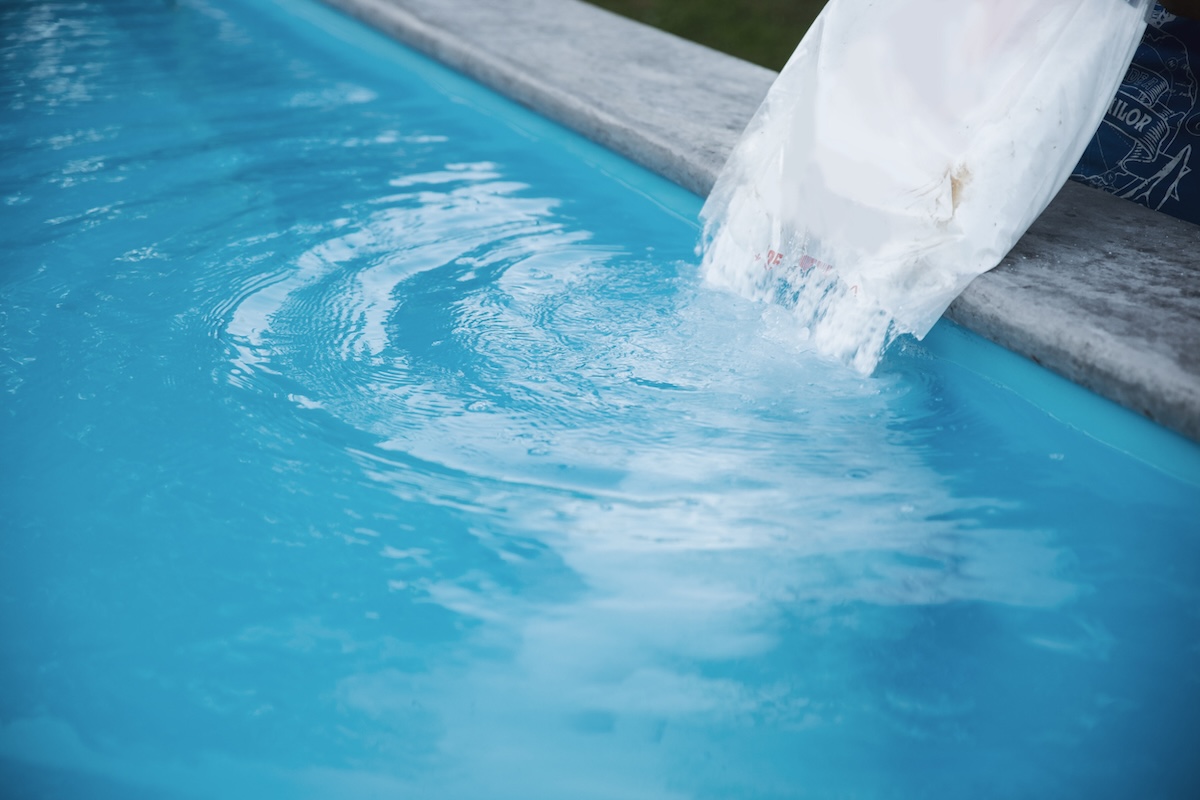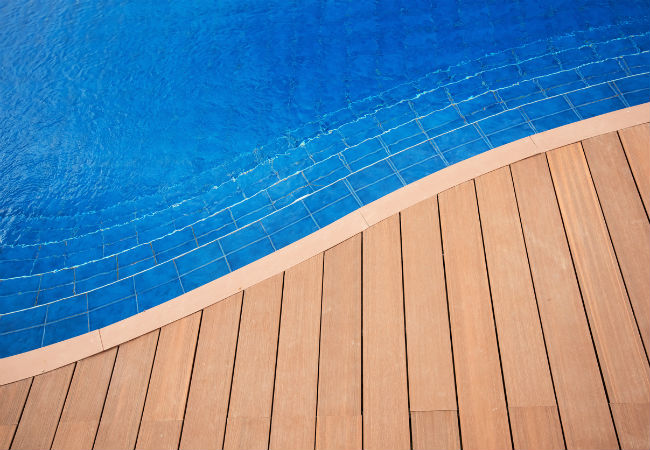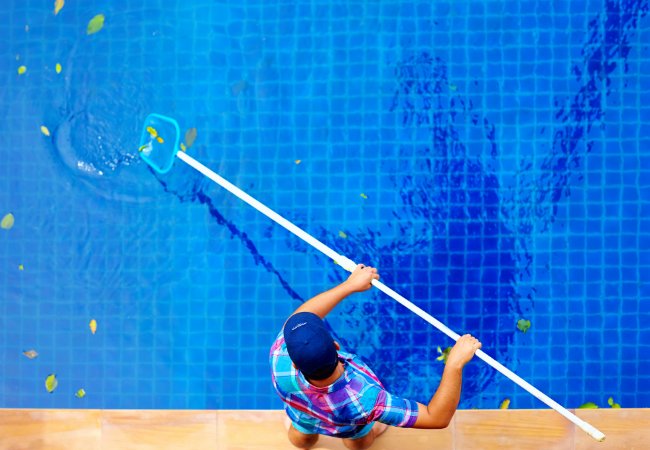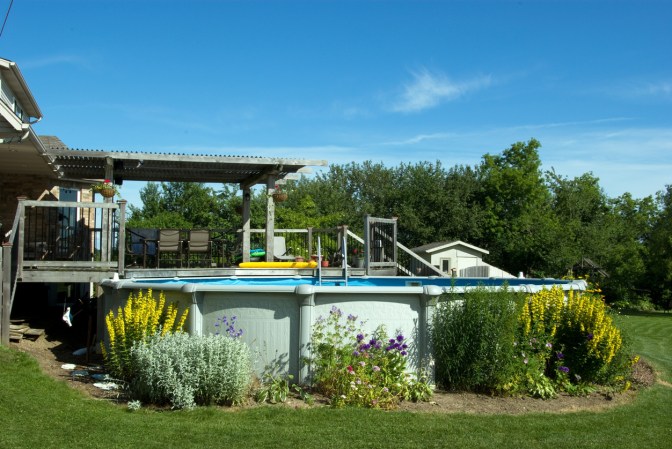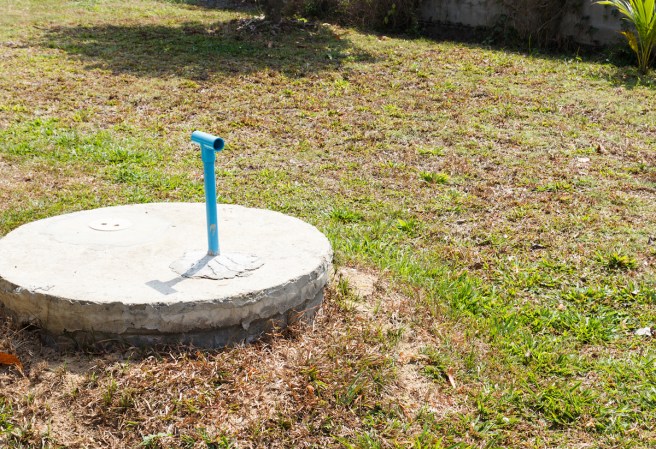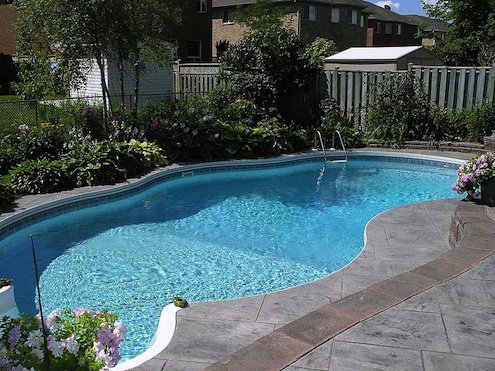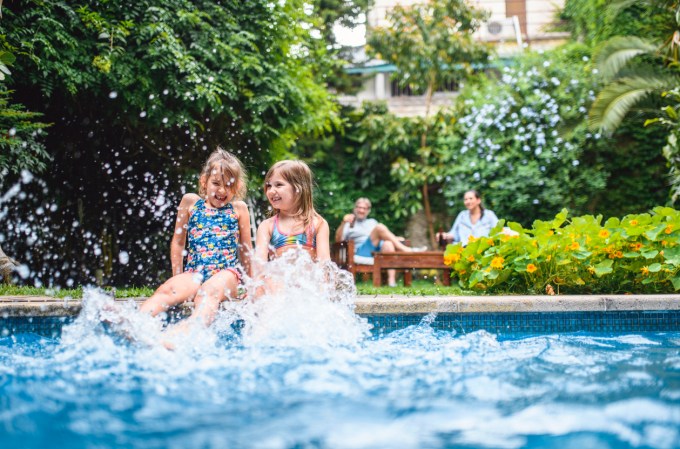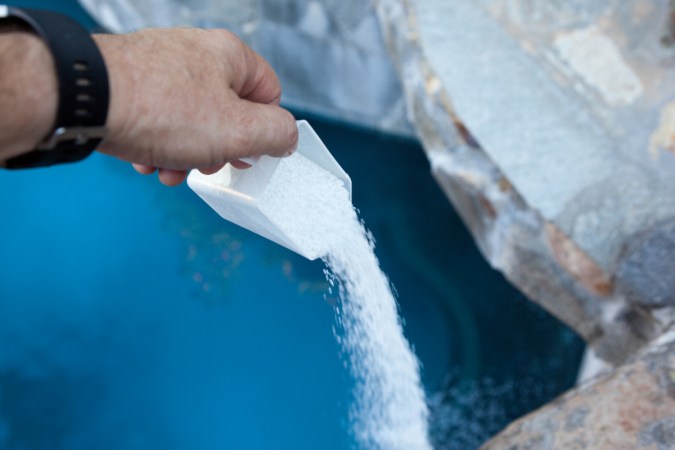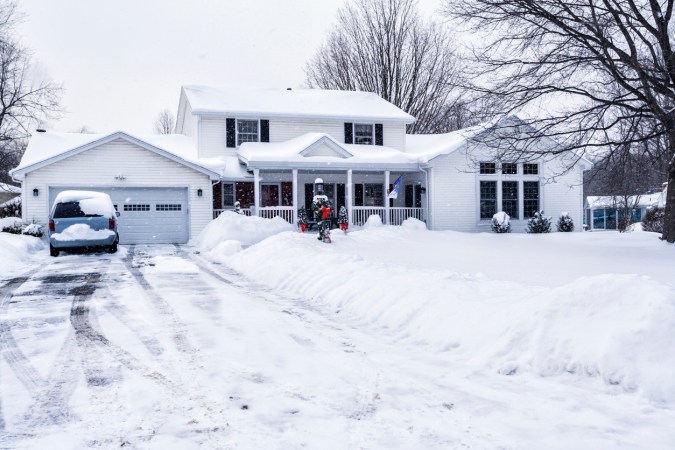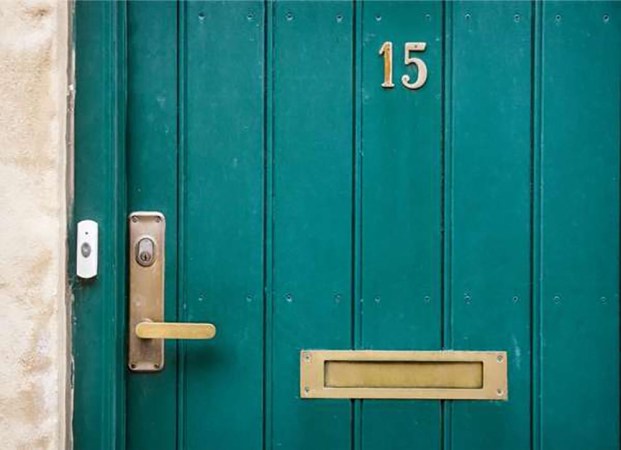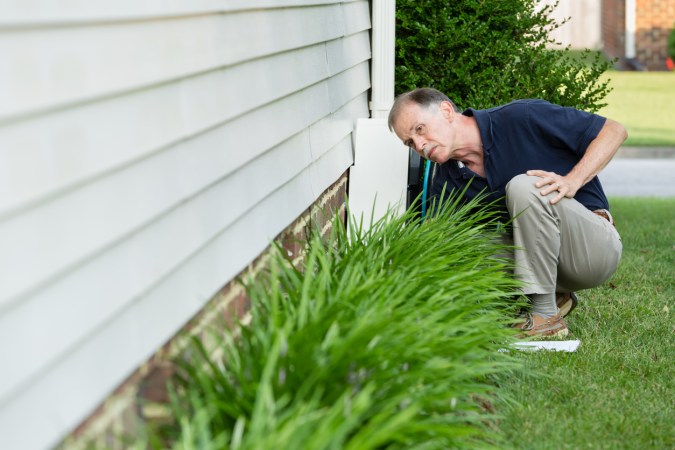We may earn revenue from the products available on this page and participate in affiliate programs. Learn More ›
Many homeowners are under the impression that the water in a saltwater pool will be similar to ocean water, but that isn’t quite how it works. A saltwater pool actually has about 10 times less salt in the water than the ocean, and this amount needs to be maintained for the pool to remain clean and clear.
Standard chlorine pools rely on regular additions of chlorine or bromine to disinfect the water, while saltwater pools have an electrolytic chlorine generator that breaks down the salt in the pool to generate chlorine. The chlorine that’s released into the water when the salt is broken down sanitizes the pool water in much the same way as store-bought chlorine with one major difference: Saltwater pool chlorine doesn’t produce the same amount of chloramines, which are the byproduct of store-bought chlorine and are primarily responsible for strong chlorine smells, eye redness, and skin irritation.
“Saltwater pools are a great option for people who prefer a more organic swimming pool experience.”
Alan Walker, Senior Vice President of Operations at Anthony & Sylvan Pools
“Whether to own a saltwater or chlorine pool is really about personal choice,” Alan Walker, Senior Vice President of Operations at Anthony & Sylvan Pools, a pool company that services 15 states and Washington, D.C., tells Bob Vila. “Some [homeowners] may be drawn to a saltwater pool initially, but learn that chlorine is a better option for their lifestyle, and vice versa. A traditional chlorine pool requires routine replenishment of chlorine, either in the form of pucks or liquid, while saltwater systems require cleaning and component replacements to keep them operating efficiently.”
PRO: A saltwater pool is easier on your eyes and skin.

The electrolytic chlorine generator in a saltwater pool uses electrolysis to split the salt into its component parts, releasing chlorine into the pool water to disinfect the pool. By avoiding the use of store-bought chlorine products, the occurrence of chloramines in the water can be reduced.
This helps to prevent the uncomfortable side effects, and the strong chemical smell, that are common with traditional chlorine pools.
CON: A saltwater pool is more expensive than a chlorine pool.
While swimming in a saltwater pool feels better on the skin and eyes, it may not feel as good when the bill for the installation comes in.
“Saltwater pools don’t require the regular purchase of chemicals to maintain the balance in the water, but it’s not a significant difference in maintenance cost each year,” Walker says. The tradeoff is that “saltwater pools often require a larger up-front cost than chlorine pools.”
Pools can range from about $10,000 to $40,000 and up on average, depending on whether it’s an in-ground or above-ground pool, and whether it’s a fiberglass or gunite pool.
Installing a chlorine system for the pool only costs about $100 to $400, but installing an electrolytic chlorine generator can cost up to $2,500. The generator cell, which ranges from about $200 to $700, will also need to be replaced every few years in a saltwater pool.
PRO: Saltwater pools usually require less maintenance than chlorine pools.
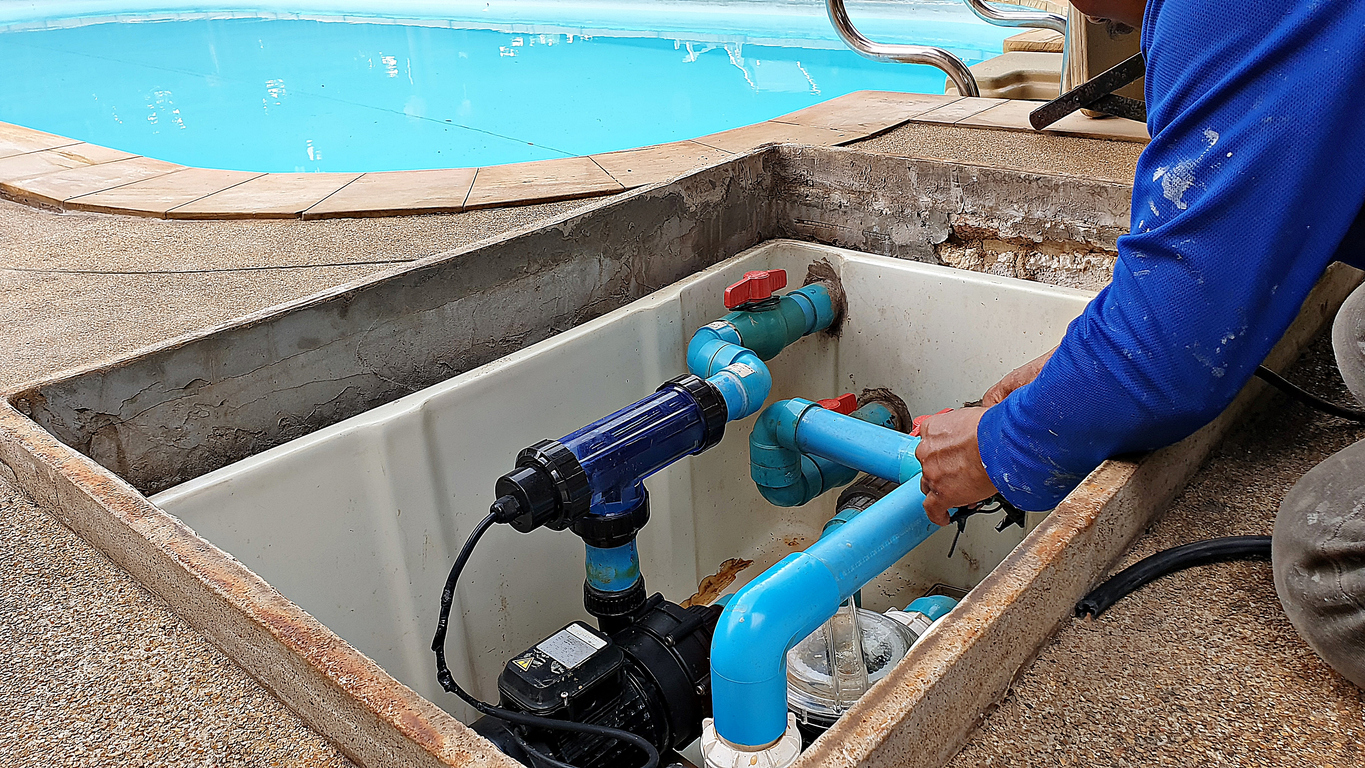
The ongoing chemical-related tasks associated with owning a non-saltwater pool typically include testing the chemical balance of the water, adding store-bought chlorine, shocking the pool when necessary, and adding additional chemicals to help balance the pH, calcium hardness, total alkalinity, free chlorine, free bromine, and to reduce any heavy metals present in the water.
“Saltwater pools are a great option for people who prefer a more organic swimming pool experience,” Walker explains.
What does saltwater pool maintenance look like? The electrolytic chlorine generator only adds chlorine as needed, so homeowners don’t need to worry about adding chlorine, or having to use multiple chemicals to regularly balance the pool water composition. Just add salt at the beginning of the swimming season and monitor the levels with bi-weekly tests. Add additional salt as necessary to maintain the chlorine levels in the pool.
As is the case with chlorine pools, saltwater pools can freeze under certain conditions. The salt content, however, lowers the freezing point, making them less susceptible to freezing. If your pool is not equipped with freeze protection, consider adding a salt chlorinator winterizing kit in cold weather.
CON: Saltwater pools have to be repaired by expert technicians.
While repairs to the filter or pump of a chlorine pool should still be handled by an experienced technician, any issues with the water composition can typically be fixed by using a pool test kit. Regularly testing the water and adding the necessary chemicals will ensure that you have the correct balance for safe swimming.
Unfortunately, most homeowners don’t have the expertise required to handle saltwater swimming pool repairs on their own. The electrolytic chlorine generator is a complicated piece of equipment that should only be repaired by an expert technician who can ensure that it’s working correctly and that the water is safe for swimming. Those who are considering installing a saltwater pool should also know that the chlorine generator may use slightly more electricity than traditional chlorine pools—your electricity bill may well increase.
The good news is that with proper care and regular upkeep, a saltwater chlorine generator can generally last 5 to 7 years at a time.
PRO: Saltwater pool owners don’t have to store dangerous chlorine at home.
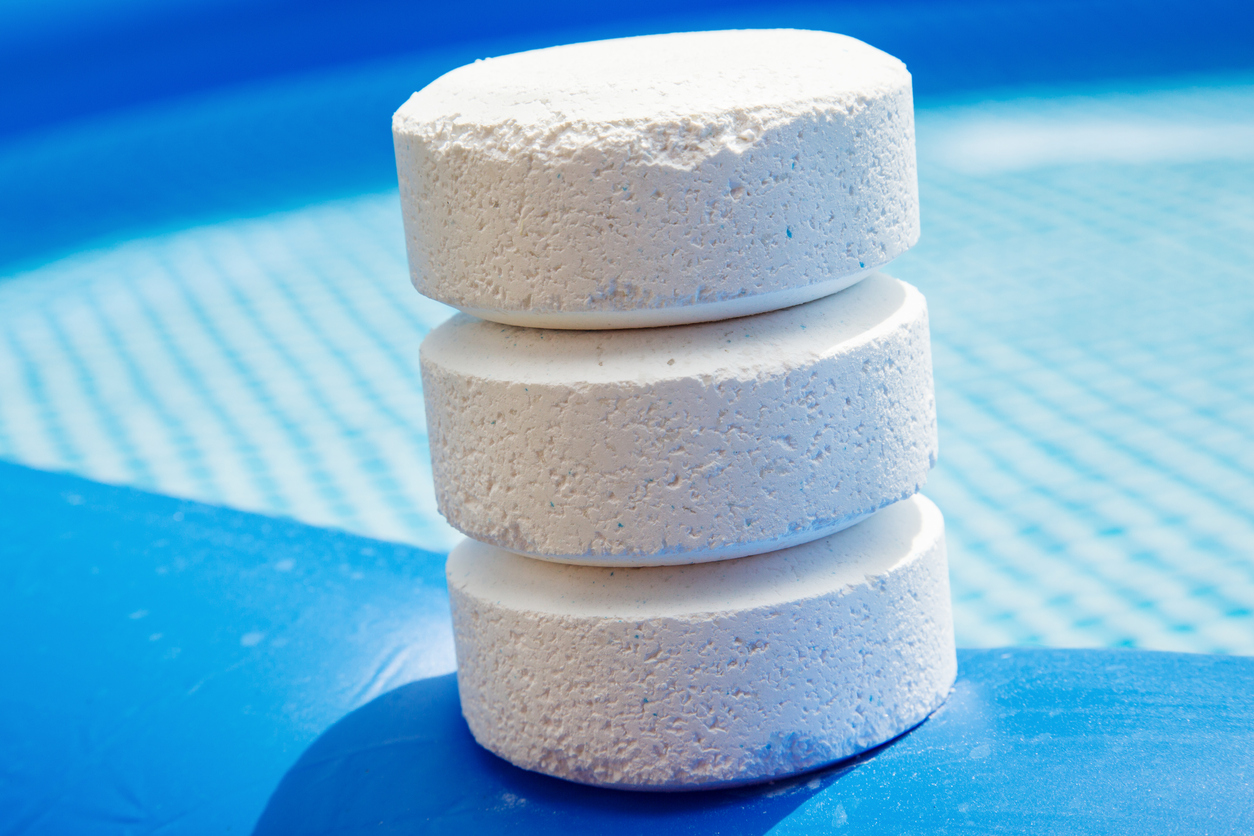
Keeping concentrated forms of dangerous chemicals in the home, shed, garage, workshop, or even in a small pool box can pose a hazard to the people, animals, and plants in the surrounding area. If you have a chlorine pool, you need to have these chemicals at the ready in order to maintain the chemical balance of the pool water.
Saltwater pools use electrolysis to split salt and create the required amount of chlorine with the electrolytic chlorine generator, so homeowners never need to worry about storing bottles or buckets of harmful chemicals including chlorine, bromine, stabilizer, clarifier, algaecide, and more.
CON: Salt can damage some materials in the pool area.
The process of breaking down salt in the water to generate chlorine to disinfect the pool comes with a lot of great saltwater pool benefits to swimmers’ skin, eyes, and hair, but the salt is a corrosive component that can damage metal objects, like heaters, ladders, diving board brackets, and more.
“Saltwater pools are a great option for sustainability if a homeowner would like a more natural look,” Walter states. “Because there are fewer chemicals directly in the water, it’s gentler on plants nearby, but it can cause furniture and decking to corrode faster.”
Over time, the salt degrades these metals, weakening ladders and brackets, and causing rusting. For this reason, it’s important to regularly inspect the interior and exterior of the pool, including all pool equipment and any nearby structures, like a shed or deck. Try to clean pool water from these surfaces whenever possible, but replace or repair the objects or structures when damage is detected.
PRO: Saltwater feels softer than traditional chlorine pool water.
Chlorine pools use store-bought chlorine to help keep the pool water balanced, but these products usually combine chlorine with binders and additives that break down in the water and increase the total dissolved solids in the pool, and make the water feel harder on the skin.
The soft feeling that is often associated with saltwater pools is typically due to the low level of chlorine and total dissolved solids in the pool. Because the amount of chlorine in a saltwater pool is controlled by the electrolytic chlorine generator, chlorine levels, while remaining effective, tend to be lower than in a typical pool, where owners often “shock” the pool with high levels of chlorine. Furthermore, generating chlorine via the electrolytic chlorine generator means fewer binders and additives in the water, too.

